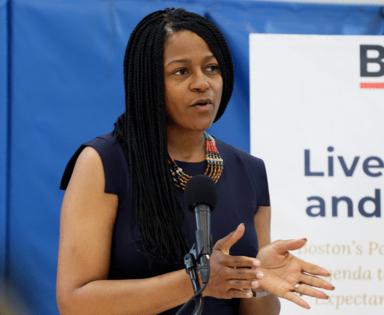Boston to distribute Narcan via vending machines, kiosks to prevent opioid overdoses
Published in Health & Fitness
BOSTON — Boston will have four vending machines and eight indoor kiosks distributing life-saving Narcan and other harm reduction supplies in another step toward preventing overdose deaths, Mayor Michelle Wu and the Boston Public Health Commission announced.
“Unfortunately, many people living with substance use disorder don’t use harm reduction tools, like naloxone and clean syringes, due to stigma, lack of access or unawareness,” said Public Health Commissioner Bisola Ojikutu. “These vending machines and kiosks are a low-cost, compassionate way to destigmatize harm reduction and expand access throughout our city.”
Naloxone, known by the brand name Narcan, is a medication used to rapidly reverse opioid overdoses. Other harm reductions supplies intended to keep people safe and alive include safe clean injection kits and fentanyl test strips.
The kiosks and public health vending machines are part of an “evidence-based strategy” of expanding access to naloxone to combat the city’s opioid crisis, the Boston Public Health Commission (BPHC) said.
The commission cited a 33% decrease in overdose deaths to 68 deaths in Boston in the first four months of 2024 compared to the same period in 2023, noting “promising results” of the strategy. BPHC was using about $7.5 million to expand access to naloxone and other resources as of October 2024.
Within the framework of Boston’s federally-funded $2.7 million Overdose Data to Action program, BPHC said they will set up the four public health vending machines at existing harm reduction, homeless services, and medical program facilities. The state purchased a total of 14 of the vending machines.
In addition to the naloxone and harm reduction supplies, the organizations at each site may choose to stock the machines with public health necessities like pregnancy tests, socks and PPE, city officials said.
The machines will be at BPHC Recovery Services in the Finland Building, Southampton shelter, EnVision Hotel, and North End Waterfront Community Health Center’s Charlestown public housing location.
“This work reflects our continued commitment to community health care by increasing access to life saving supplies, inviting individuals into care, and reducing stigmatizing experiences for the Charlestown community,” said David Perry, Director of Substance Use Disorders at North End Waterfront Health, stating they are “proud to partner with BPHC on this initiative.”
The naloxone kiosks, funded by Carelon and the Massachusetts Behavioral Health Partnership, will likewise go up at eight locations strategically aimed to reach of populations with higher overdose rates, the commission said.
The indoor kiosk locations include Bridge Over Troubled Waters, Harvard Street Neighborhood Health Center, Recovery on the Harbor, SPOKE Gallery, Suffolk County Jail and House of Correction, The Phoenix, and Woods Mullen Women’s Shelter.
The kiosks, repurposed from old newspaper stands, will also offer connections to support resources like the phone number for the Massachusetts Behavioral Health Help Line, BPHC said, which offers “free clinical assessments, crisis support, and referrals to treatment for substance use and mental health disorders.”
Similar to Boston, Massachusetts saw a significant 23% drop in overdose deaths in the past year, totaling 2,032 drug overdose deaths in the 12-month period that ended June 30, 2024. In the U.S., overdose deaths decrease about 14% in the same period.
---------
©2024 MediaNews Group, Inc. Visit at bostonherald.com. Distributed by Tribune Content Agency, LLC.










Comments